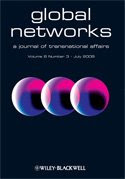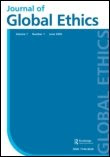University of Surrey / Roehampton University
CRONEM 6th ANNUAL CONFERENCE 2010
Joint international conference with the Runnymede Trust (http://www.runnymedetrust.org
Living Together: Civic, Political and Cultural Engagement Among Migrants, Minorities and National Populations: Multidisciplinary Perspectives ( 29 - 30 June 2010)
University of Surrey, Guildford, UK
CALL FOR PAPERS
(Deadline 15 February 2010)
This conference will range across different academic disciplines and explore links between academic knowledge, policy, practice and the media. The format will consist of keynote addresses, parallel paper sessions, convened symposia, a poster session and a panel debate organised by the Runnymede Trust.
Speakers already confirmed:
Benjamin R. Barber, President (CivWorld at Demos) and Walt Whitman Professor Emeritus, Rutgers University, USA
Constance Flanagan, Professor of Youth Civic Development, Penn State University, USA
Yvonne Galligan, Director, Centre for the Advancement of Women in Politics, Queen's University Belfast
Jørgen S. Nielsen, Director, Centre for European Islamic Thought, University of Copenhagen, Denmark
Lord Bhikhu Parekh, Professor of Political Philosophy, University of Westminster, UK
Antje Wiener, Professor of Politics, University of Hamburg, Germany
Despite the recent " Obama effect" , conventional forms of political participation have declined in many countries in recent years, with growing levels of political apathy, disengagement from formal democratic processes and increasing distrust of, or lack of confidence in, political institutions. However, research suggests that issues, which might have mobilised individuals into taking political action in the past, are now being tackled in many cases via voluntary, community or charitable activities, protest movements or consumer activism instead. Hence, current trends in political participation, especially among younger people, may be indicative not of public disengagement per se but of a shift to a different kind of public activism.
Gendered perspectives on cultural, civic and political engagement, which explore the conditions governing women ' s participation, as well as perspectives which examine engagement and participation among migrant or minority groups, can be especially illuminating here. Women, migrants and minorities play vital roles in any society, contributing through their skills, labour, taxes, community participation and cultural activities. Yet, when restrictive criteria, practices or policies prevent members of these groups from participating fully in the political, civic and cultural life of the country in which they live, members of these groups often develop novel forms of engagement in order to circumvent the obstacles.
Policy can have a crucial impact on levels of participation, either by creating impediments and barriers to participation by specific groups, or by minimising these impediments. However, policy issues can be complex to tackle, with the policies which exist at different levels (e.g., at community, regional, national and supranational levels) often being incongruent with each other, and with discrepancies frequently existing between intended policy, the content of policy texts, policy implementation, and the interpretation of policy by citizens.
This conference aims to take stock of the different forms of civic, political and cultural engagement which currently exist, and investigate the factors and processes which are driving them. A special feature of the conference this year will be an event organised by the Runnymede Trust, which will consider where Britain stands 10 years after the Parekh Report (http://www.runnymedetrust.org/projects/meb/report.html) on the future of multi-ethnic Britain and 25 years after the Swann Report.
We would like to encourage the submission of papers which address the following themes:
> · Active engagement, interaction, expression and dissension at civic, political or cultural levels
> · The participation of young people, women, migrants and minorities
> · Different forms of engagement among adult national majority populations
> · The role of public policy in civic, political or cultural participation
As this is an international conference, papers reporting on contexts other than the UK are especially welcome.
For more information about the Call for Papers, abstract submission forms and registration, please visit http://www.surrey.ac.uk/Arts/CRONEM/index.htm
For any conference queries, please contact Ms Melek Muderrisgil (Melek.Muderrisgil@surrey.ac.uk)



